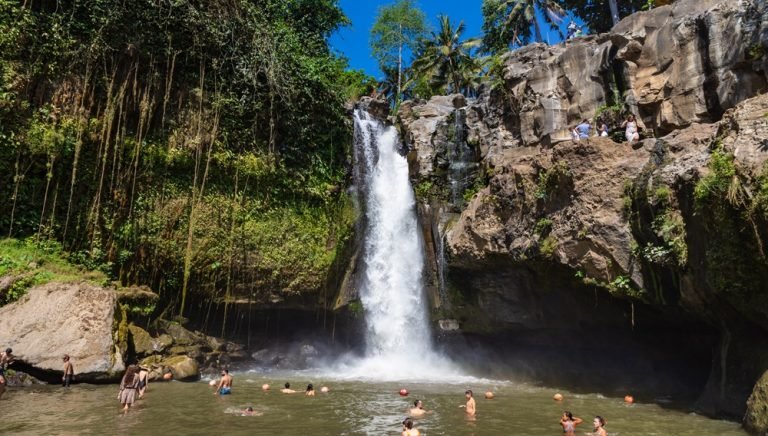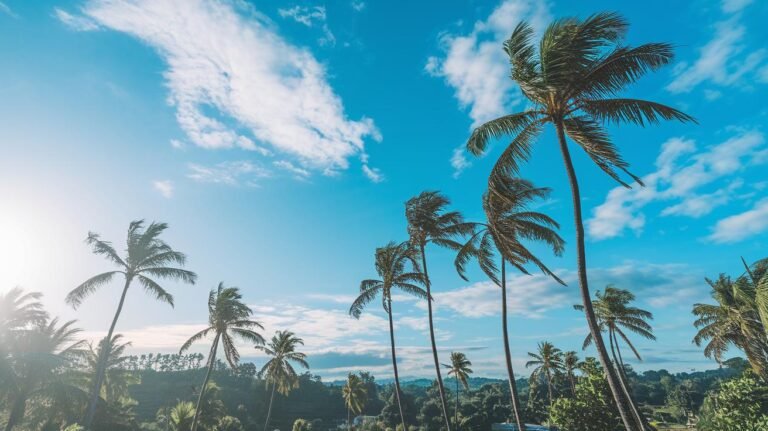Drought-Stricken Bali Village Saved as Goddess Danu Pours Golden Jug to Create Lake Batur
Long before modern maps charted Bali’s shores, people spoke of deities walking among them. In that age, the village known as Desa Batur lay at the southern edge of Mount Batur’s volcanic slope. Homes built of bamboo and palm thatch clustered around a simple stone shrine. Towering trees and creeping vines draped the lower slopes, lending an aura of mystery. Villagers believed that nature spirits watched over their daily lives.
Then a harsh drought gripped the land, stretching its grip over every field and garden. Old springs that once gurgled at the mountain’s base slowed to a trickle. Streams that danced through rice terraces dried up. The earth cracked in jagged patterns under a relentless sun, and the crops that had filled baskets turned to dust.
As water vanished, fear spread through Desa Batur like wildfire. At dawn, families packed into the village temple, its wooden pillars carved with ancestral symbols. Flames from oil lamps cast shifting shadows on stone idols. The air thickened with incense as villagers bowed on woven mats and lifted urgent prayers to the mountain gods.
“Oh gods who dwell on Mount Batur, listen to our prayers. Send us rain so that life in our village may return to its former state. We are willing to do whatever you ask, as long as our village is saved.”
News of their pleas reached King Batur, a ruler known for balancing firm justice with deep compassion. In his royal hall, he studied reports beneath banners bearing his family crest. After a moment of reflection, he summoned his most trusted guards and issued a solemn command:
“My soldiers, go to the summit of Mount Batur and seek guidance from the gods. We cannot allow our village to be destroyed by this drought. Bring back their message to me, whatever it may be.”
Eager to obey, the guards set out before sunrise. They pushed through emerald ferns, stumbled over twisted roots, and climbed steep lava flows left by ancient eruptions. Mist coiled around mossy boulders, and distant birdcalls echoed through narrow ravines. Still, they never wavered in their resolve to secure help for their parched homeland.
On the third day, at an elevation where clouds brushed bare rock, they discovered a hidden spring that defied the drought. There, beside that miraculous water, stood a figure radiant with calm authority. The air itself seemed to glow. This was Goddess Danu, patron of rivers and lakes. She regarded them with knowing eyes, as though weighing each hope and fear they carried.
Goddess Danu spoke in a soft yet authoritative tone:
“I have heard your people’s prayers, King Batur. They are filled with desperation, but also with hope. I will grant them water to revive the land, but they must promise to care for and protect the lake that will form with their whole hearts.”
At her words, the golden vessel she held tilted, and a clear stream poured from its spout. The water raced down rocky gullies, pooling in hollows and carving a new basin at the mountain’s foot. Within hours, a vast lake took shape, its surface gleaming under the sun and reflecting the sky above.
By evening, the nascent lake shimmered in hues of cobalt and jade. Birds circled overhead, and deer approached the shore with cautious steps. Far below, the people of Desa Batur heard the distant rush of water and felt hope stir in their chests. The mountain had answered their call.
The next dawn, every villager hurried to the lakeside. Men, women, and children knelt on the grassy bank beneath swaying ferns. Hands pressed together, they spoke with reverent voices:
“Oh Goddess Danu, we promise to care for this lake with all our hearts. We will tend to it as we would our own children. This lake is our life, and we will ensure that its waters remain clear and pure.”
Their vow echoed across the calm surface as sunlight danced on gentle ripples. Goddess Danu inclined her head, her gaze serene but firm. Raising a slender finger, she brought the whispering breeze to stillness before speaking again:
“Remember this promise, for as long as you care for the lake, you will live in prosperity and peace. However, if you betray this promise, the water will leave you, and this land will become dry and barren once more.”
Over the following months, gentle rains returned to the hills of Batur. Rice paddies turned brilliant green, mango trees sagged under golden fruit, and wild orchids bloomed along creek banks. Streams and wells brimmed again. Children splashed along the shore, catching small fish in woven baskets to trade at market stalls.
Before vanishing into the unseen world from which she had come, Goddess Danu gathered the villagers at first light. A soft glow surrounded her as she shared one final instruction:
“My children, remember that water is the source of life. By preserving the water, you preserve life itself. Always respect nature and never be greedy in taking what is given. If you forget this message, you will lose everything.”
Her form rose in a ripple of warming light and then faded, leaving behind silence that held her words forever. In the years that followed, Desa Batur earned renown across Bali for its fertile fields and the lake that sustained them. Farmers offered fruit and flowers each season, and storytellers passed on the tale of King Batur’s envoys and the pact they forged.
Today, Lake Batur still rests in the volcanic basin, its waters clear beneath ever-shifting skies. Locals walk morning paths around its shore, pause at the ancient temple, and cast blossoms into the water as tokens of respect. With every ripple, the lesson of Goddess Danu lives on: caring for the source of life binds communities to the land, and promises made to the earth must never be broken.







